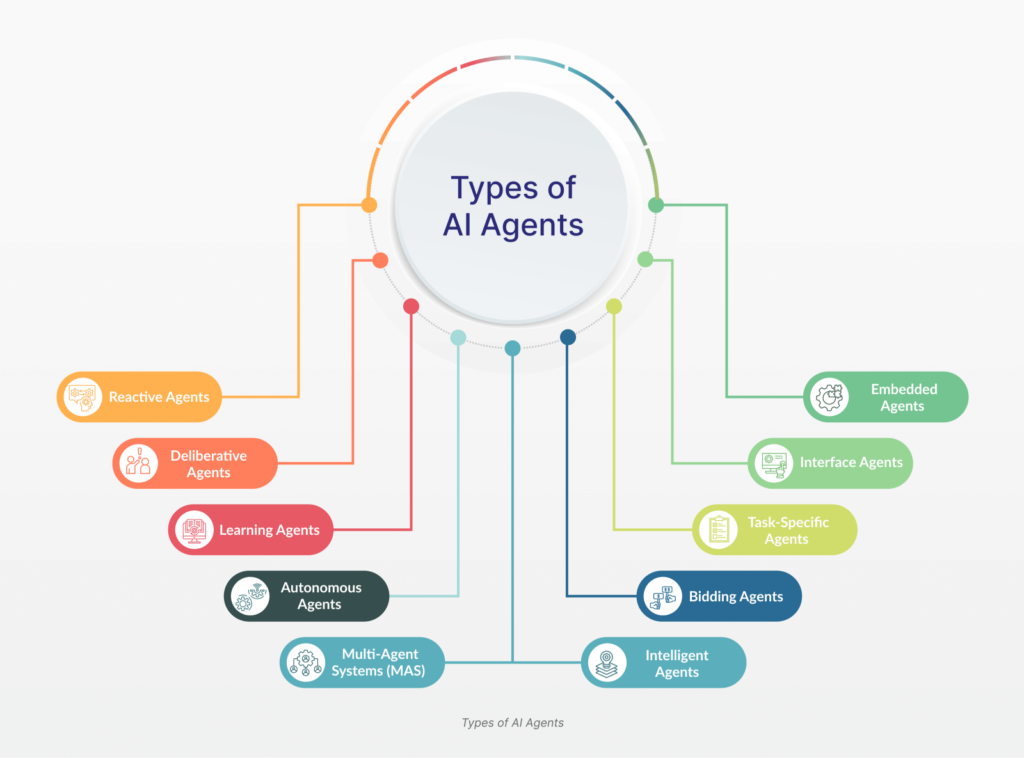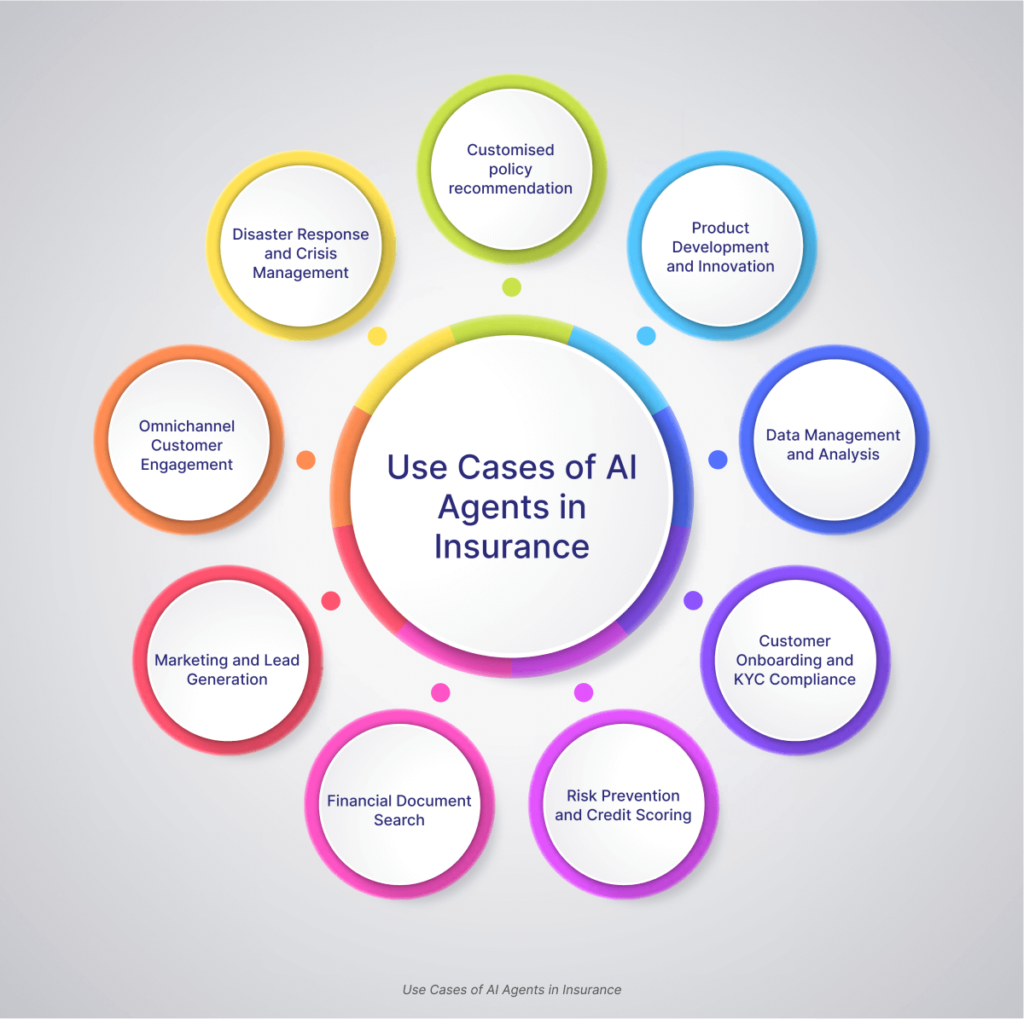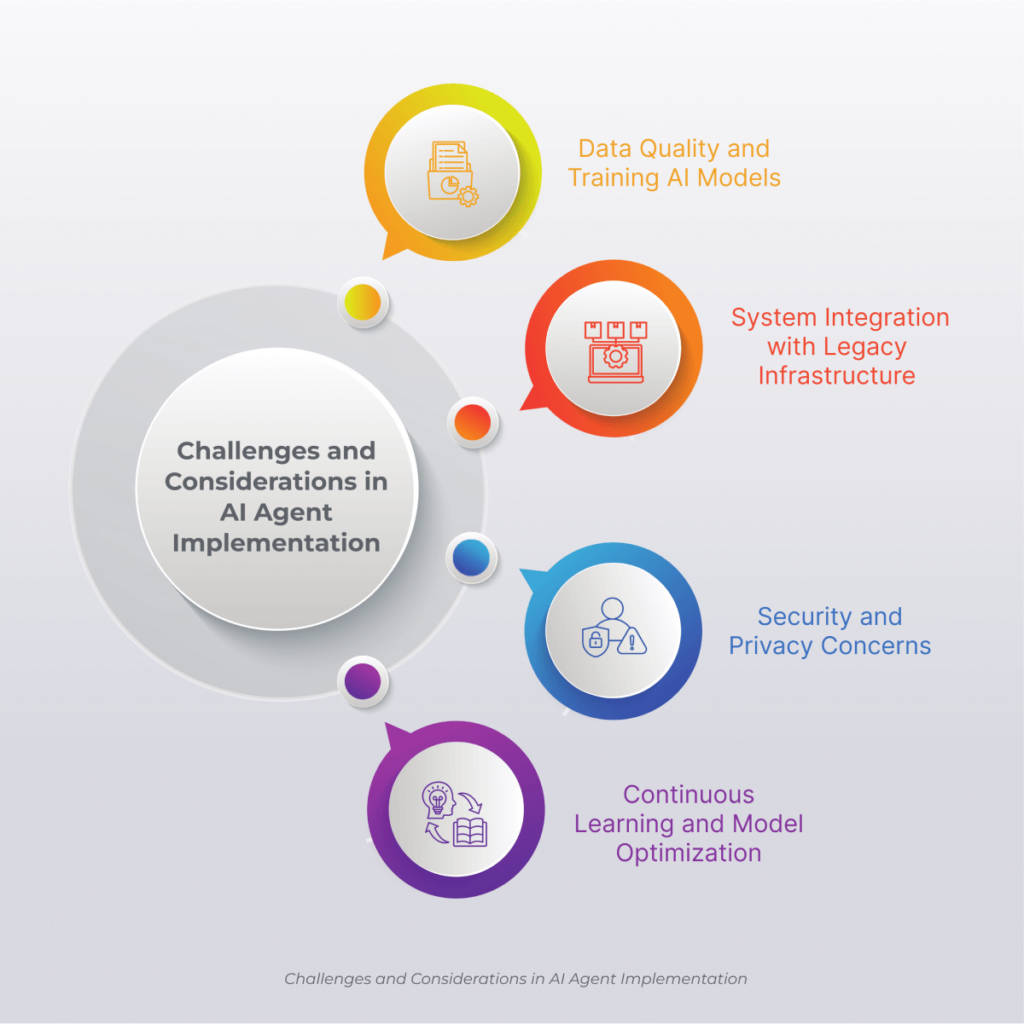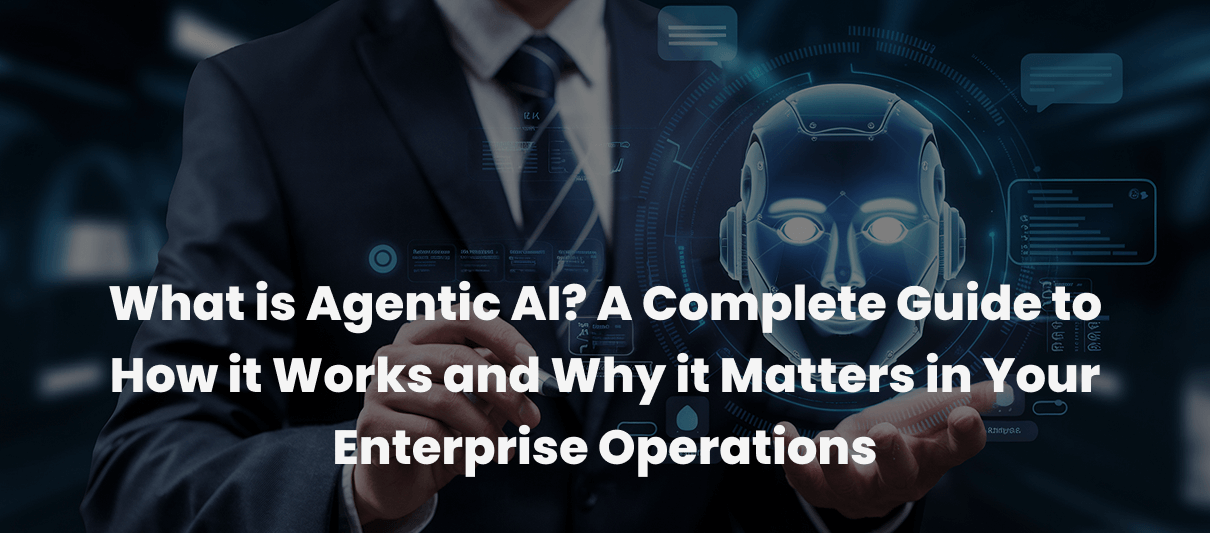Transforming Legacy Insurance Systems Through AI Agents: Exploring Key Capabilities and Use Cases of Conversational AI in Insurance Operations
Introduction
Customers choose insurance agencies based on service speed, accuracy rate, and level of personalisation. Lacking any of these will result in dissatisfied customers and lost business opportunities. In order to bridge the gap between inefficient business output and level-headed business output, insurance companies need to adopt conversational artificial intelligence [AI] in their workflow and customer interactions.
Conversational AI refers to any virtual assistance that helps with customer interaction and workflow automation. This blog explores everything about AI in the insurance industry, giving a complete overview of conversational AI, its top capabilities, and its role in this industry. It also explores AI’s use cases, challenges, and best practices for integrating it into legacy systems.
Having a clear picture of conversational AI is essential in understanding its core capabilities in order to make the best use of it in the insurance industry.
Understanding Conversational AI in Insurance
Conversational AI leverages natural language processing (NLP) and machine learning (ML), predictive analysis, autonomous decision-making, deep learning, and fraud detection to understand, process, answer queries, and automate workflows. This technology comprehends human language and generates human-like answers through voice or text patterns. Conversational AI is also capable of handling routine customer service inquiries, directing users to the right resources, or even resolving common issues, allowing human agents to focus on crucial tasks.
There are different types of conversational AI for specific purposes. One of the major types of conversational AI is conversational AI agents.
Curious to know more?
Read the blog on conversational AI for a clear and detailed understanding.

AI Agents
An AI agent is a software program that understands its environment, fetches the necessary information, and autonomously determines the essential action to take. Regardless of their complexity, AI agents can be tailored to perform specific tasks or multi-step tasks.
Though AI agents can independently make decisions, they still need the environment and goals set by humans to function. AI agents help the workforce automate workflows, collect data, analyse, learn, and interact with customers effectively. Through these advantages, conversational AI agents provide significant technical benefits such as automation, real-time decision-making, learning from experience, and scalability.
There are several agent types in artificial intelligence.
Types of AI Agents

- Reactive Agents
- Deliberative Agents
- Learning Agents
- Autonomous Agents
- Multi-Agent Systems (MAS)
- Intelligent Agents
- Bidding Agents
- Task-Specific Agents
- Interface Agents
- Embedded Agents
Leveraging AI in Insurance
Incorporating conversational AI agents into the insurance industry, where legacy systems are deeply rooted, can result in groundbreaking outputs. Dependence on manual documentation and intricate data-gathering procedures can be altered. It can improve the operational efficiency of the agency through automation, reduce time and cost, help collect and analyse data, and simplify the claims process, offering a 24/7 self-service customer experience.
AI intelligent agents help human agents concentrate on much more complex and strategic tasks by automating routine and intensive tasks. AI agents facilitate customised queries that can work on tasks like transactions, give policy details, collect and authenticate documents, and guide the customer through the application process. AI agents also ensure that preemptive risk management is involved by identifying, assessing, and addressing risks before they materialise into significant problems.
Accenture’s 2024 report stated that insurers are increasingly adopting AI agents to assist customer interactions and automate workflow while moving toward the future. With this as the predicted scenario in 2025, it is essential for insurance companies to adopt AI agents for enhanced business output.
The first step in outsourcing and deploying this futuristic technology is to comprehend what exactly an AI agent is capable of.
Key Capabilities of AI Agents in Insurance Operations
Underwriting
Underwriting is a crucial process in the insurance industry that determines the premium of the policies and claims approval based on the situation, severity, and agreement. AI agents reduce manual error and time by researching large databases, the history of the customer, medical records, customer behavior, and external factors to evaluate the risk using predictive analytics and machine learning algorithms.
AI agents streamline the underwriting process by automating repetitive tasks, such as document verification and risk scoring. This reduces processing times and allows insurers to issue policies more quickly, improving customer satisfaction. AI agents ensure that insurance guidelines are followed strictly, therefore avoiding subjective variation between human writers. Thus increasing fair decision-making across all applications.
Fraud Detection
AI agents possess the ability to identify fraudulent claims and transactions using a past-learning method to recognise repeated patterns and anomalies. AI agents leverage ML models to recognise potential risk factors so that they save insurers from involving themselves in high-risk claims.
This technology mitigates risk by investigating such suspicious claims and transactions through proactive management, which protects against financial losses and reputational damage. It also monitors trends and predicts future risks to enable preemptive actions. It also suggests coverages and preventive measures for customers according to the environment.
Data Aggregation
AI agents are very well known for their ability to fetch real-time data from different resources such as IoT devices, historical records, medical documents, past experiences, queries, and customer applications. By integrating and analysing these data, AI agents understand customer behaviors, patterns, preferences, correlations, and risk determiners.
With the help of tools and devices such as NLP, ML, data APIs, computer vision, and IoT devices, AI agents collect data such as structured, unstructured, and sensor data. With these data, insurance companies can indulge in better decision-making and optimise time and resources without intensive and reckless processes.
Claims Processing
AI agents automate meticulous and time-consuming processes such as claims processing. AI streamlines tasks like data collection verification, document authentication, damage and preliminary assessment, payment process, and approval of claims.
By adopting AI agents for this particular process, insurance companies can escape from manual error and inconsistency or lagging in the claim process. It enables direct settlement faster with reduced processing costs, improved customer satisfaction, and better service since claims are resolved much quicker and more accurately.
Use Cases of AI Agents in Insurance

1. Customised Policy Recommendation
AI agents read thoroughly the customer’s desires, preferences, risk factors, and environments to suggest suitable policies. The interaction between the customer and the virtual assistant using NLP is more personalised and humanised, resulting in satisfied customers. Be it policy upgrades or tailored advice on claims, these agents ensure they deliver accuracy and real-time solutions. For instance, a person with a history of heart illness will be suggested policies and premiums customised for his/her risk factors.
2. Product Development and Innovation
AI agents study market trends and customer data using ML technology to build new insurance products and fill any existing or future gaps. By analysing such inefficiencies or needs in insurance sectors, AI agents urge companies to simulate market scenarios to refine offerings, ensuring competitive advantage and customer-centric solutions.
Innovating policies and adjusting the customer’s pricing model according to their past behavior and current scenario can enhance customer comfort and loyalty.
3. Data Management and Analysis
AI agents in insurance rely on a suite of advanced technologies to aggregate, clean, manage, process, and analyze vast data effectively. Technologies and tools such as the following help AI agents manage data in the insurance industry without redundancies and ensure scalability.
- Cloud computing platforms
- Data warehousing solutions [for flexible handling of semi-structured and unstructured data]
- NoSQL databases
- ETL tools
- API integration platforms
These technologies also upscale the quality of analysis, resulting in accurate and deep insights into crucial data sets.
4. Customer Onboarding and KYC Compliance
By leveraging advanced technologies, AI agents make sure that all the processes and technologies adhere to regulatory regulations, such as KYC compliance. This process is initiated with an automated verification process where tools like Optical Character Recognition (OCR) get information about the customers from ID proofs, utility bills, and other identification documents. By utilising facial recognition and blockchain technologies to secure KYC data, AI agents can enable seamless sharing across institutions while maintaining privacy.
Once this data is collected, it is easy for AI agents to verify and proceed with automating the customer onboarding process.
5. Risk Prevention and Credit Scoring
AI agents evaluate risk based on the history of transactions, behavior, and external factors related to claim issuing and enable the issuers to avoid losses and tight situations. Credit scoring algorithms assess financial reliability, enhancing underwriting precision and reducing default risks. It allows insurers to set rational tariffs, thereby ensuring safe behavior.
6. Financial Document Search
By the use of NLP and IDP [Intelligent Document Processing] technology, AI agents obtain data from crucial documents such as contracts, statements, and financial records. Through these facilities, it is simpler to retrieve information using specific terms in queries for customers’ and employees’ comfort. This accelerates underwriting, compliance, and auditing tasks.
7. Marketing and Lead Generation
AI agents possess the ability to recognise potential leads by analysing customer data to generate personalised campaigns. These agents utilize data mining and predictive analytics to analyze vast datasets, including customer demographics, preferences, behaviors, and purchase histories. This enables the identification of high-potential leads and the segmentation of audiences for personalized marketing campaigns. Sentiment analysis and customer segmentation enhance targeting accuracy, improving marketing ROI [return on investment].
This enables companies to follow their potential client and create more tailored marketing opportunities to extend their customer numbers by cross-selling and upselling.
8. Omnichannel Customer Engagement
AI agents provide customer services 24/7 through all channels, such as chatbots, mobile, web, and voice assistance. AI agents facilitate unified interactions from different channels using centralized customer data platforms (CDPs). This allows the customers to view a single, consistent, and personalised customer view. This integration enables AI agents to access past interactions, preferences, and behavior patterns, allowing them to tailor responses and anticipate customer needs effectively. Multi-channel orchestration tools help AI agents to provide data and services by integrating various channels across platforms, ensuring a cohesive experience whether the customer switches from a chatbot to a call center or from a mobile app to email.
9. Disaster Response and Crisis Management
This groundbreaking technology also analysis the level of damage to the insured person, asset, or any resource. With the help of satellite imagery analysis, agencies can identify changes in infrastructure, land, and environmental conditions caused by disasters. These images enable the company to make an accurate assessment of the disaster’s scope. By leveraging geospatial analytics and weather data, integrating by utilising geographic information (GIS), IoT sensors, and weather stations, AI agents can predict and forecast potential disaster zones, allowing preemptive actions to be taken.
Challenges and Considerations in AI Agent Implementation

Data Quality and Training AI Models
Training AI agents to create effective and accurate models requires clean, high-quality, and vast amounts of data. Data exists in structured, unstructured, and raw forms, making it difficult to train and deploy such futuristic technologies. AI agents need to study vast amounts of historical and real-time data, including customer profiles, claims data, and transaction histories. Failing to meet these demands may result in inefficient data integration.
System Integration with Legacy Infrastructure
Integrating AI agents with legacy insurance systems can be challenging due to outdated technologies, siloed databases, and incompatible software platforms. To resolve this issue, API-based integration methods or middleware solutions that create a bridge between old and new systems can be adopted.
Security and Privacy Concerns
Customers entrust companies with personal information such as identity transaction details, medical information, and so forth when they deploy an AI agent for insurance. Maintaining this sensitive information securely will be the top priority of these agencies and their representative AI agents. Robust data encryption, access control mechanisms, regulatory standards, anomaly detection algorithms, and multi-factor authentication (MFA) are essential for protecting customer data.
Continuous Learning and Model Optimization
AI agents need to be continuously updated in today’s evolving market conditions. Failing to be updated may result in outdated technological malfunctions, which could lead to passing misinformation to the customers regarding policies and regulations. Model monitoring systems track performance over time, identifying areas of improvement based on new data patterns.
These kinds of challenges can be overwhelming to insurance agencies while adopting AI agents. It is crucial for companies to choose the right AI providers for deployment.
SquareOne: Your Trusted Partner for AI Solutions
SquareOne, a leading digital transformation company in the Middle East, has been transforming businesses for more than 15 years. By partnering with Kore.ai, offers groundbreaking, seamless AI solutions for all your business needs and customer experience. Kore.ai offers AI agents, AI assistance, and AI chatbots for workforce, customer service, and automating processes. SquareOne, partnering with Kore.ai, offers prebuilt and customised solutions for your business needs.
Visit SquareOne website today to transform your business operations.
Final Thought
Top insurance agencies leverage AI agents to assist their customers and accelerate workflow. AI agents improve customer interactions and automate insurance operations using various tools and technologies, which are high-cost and labor-intensive. Opting for such groundbreaking technologies will upscale one’s business strategies and operations to face any market situation while maintaining a high level of performance.
Talk with the experts at SquareOne for more personalised suggestions.















